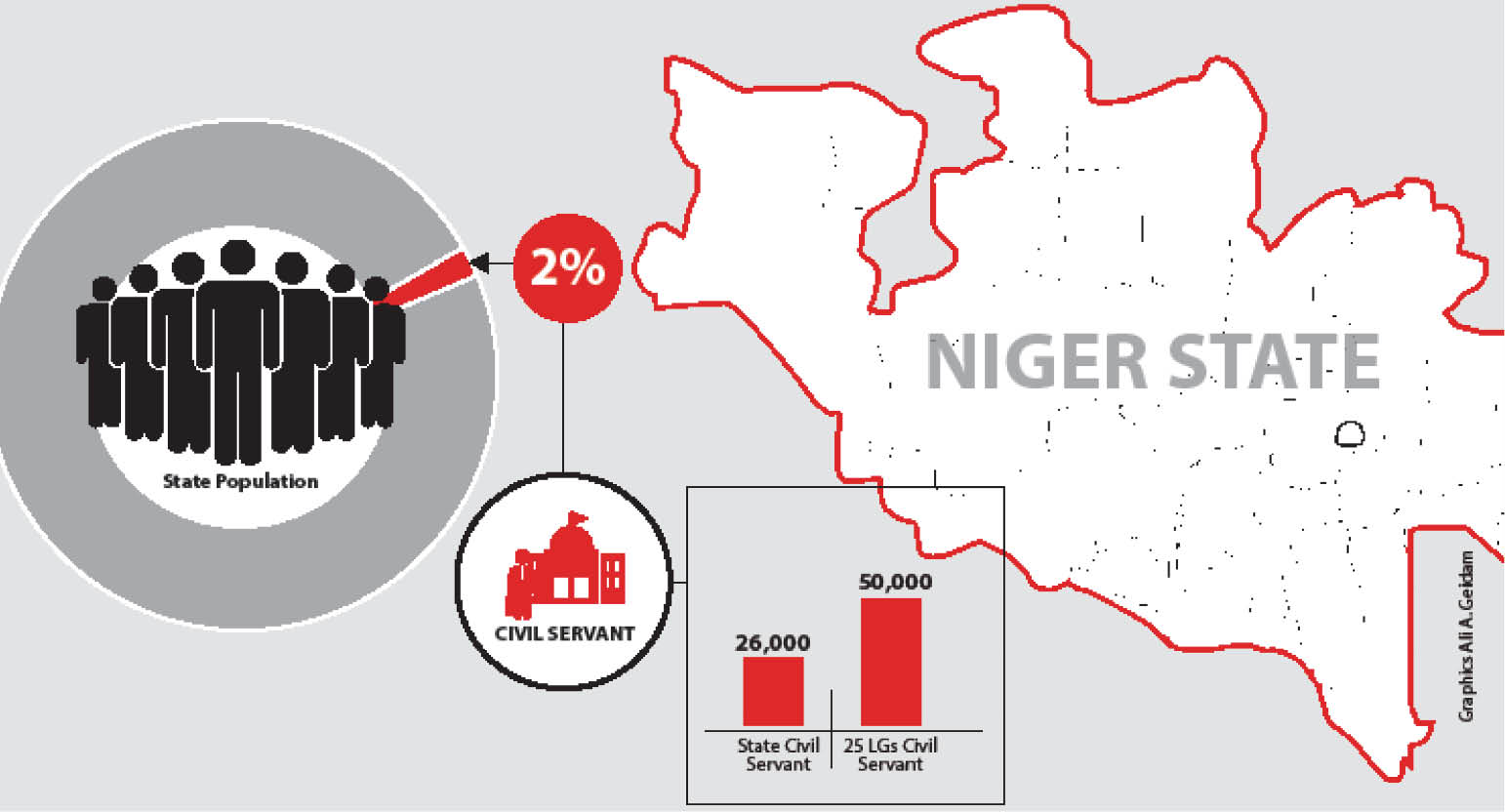(What is my opinion about the recent salary controversy in my state? Read to the end.)
I just read an intervention by a very prolific elder in the state in which it was mentioned that Niger State is a civil servants’ state where those in government make up the bulk of the voters. This is not correct.
- Nigerians celebrate peaceful, low-key Christmas amid COVID-19
- How prominent residents fled Kankara before attack
I drew the attention of our elder to the mistake and wish to build on what I told him in our private chat knowing that many hold that notion to be true – even though it might have been a typo in the case of our uncle. Enjoy.
Civil servants are not up to 80% of the state population. They are not even up to 2%.
The state civil service roll is about 26,000 strong as member of the salary verification team told me. This figure will likely be reduced to 22,000, he said. But let’s use 26,000.
Further, when I was the chief press secretary, I was told that the total number of workers in the 25 local governments was 35,000. But let’s be generous and say they are 50,000; together with those in the state employment that will make 76,000 of all public officials in the state.
That is still less than 2% if you consider that our population is four million people.
So 98% of the population of Niger State are not civil servants. Saying it is, is not fair to the majority. Saying it is, is to project an image of indolent people.
But don’t take my word for it.
How many members of your family work for the state? In my extended family of many uncles and cousins, only four of us work for the government: two for the federal government, one for the state, and one for LG. Where do the rest get the money to live their life? Or do you think we in the state take care of all the others? Not even close.
Of course, the injection of about N2 billion monthly salary into the economy is good for the markets. Because civil servants will buy food and go to the tailors, the barbers and pay school fees.
But this is not enough to sustain our markets. We have markets in Niger State that make the equivalent of the entire state’s monthly salary in a day. An example is the Mariga Cattle Market.
If only civil servants buy from our markets, we would all die of hunger. Luckily, even people from outside Nigeria do business with us and come to our markets.
Of course, it is not only salaries that come from the government. Government buys consumables and also gives contracts.
But there is a simple way to measure the significance of these contributions: compare the state’s yearly budget with our GDP, that is, our economy.
The state’s annual budget, give or take, is N100 billion and the money that is spent in Niger State yearly is $8 billion or N3.2 trillion. Meaning, N3.1 trillion doesn’t come from the state government.
If my argument holds, then it follows that no state in Nigeria is a civil servant state. Even the Federal Government’s budget is under $30 billion while Nigeria’s economy runs on $500 billion.
Postscript:
I support those who say that civil servants’ salaries should be paid in full. Even though I sympathize with the government for the fact that Nigeria is in a recession the like of which we have never had in decades. But any argument from the government wouldn’t be understood by the people because those who rely on the government are genuinely hungry. And a reading of Maslow tells us that people need to satisfy their physiological needs before the mention of anything else.
After posting this view on social media, it immediately divided readers sharply into three categories: those who agreed, those who changed their minds, and those who disagreed.
Among those who agreed was Mr. Monima Daminabo, a veteran journalist and a colleague on the Daily Trust editorial board. He said:
“Dr Dooba this misconception is not unique to your state but is spread across the entire country. Thanks for your succinct clarification.”
Some people held the opinion that Niger State was a civil service state but changed their minds after reading this piece. Among them was Abubakar Shehu who said: “Knowledge is light at any time, with this write-up, I am enlightened because I used to have the same notion. Thanks.”
Then many disagreed. Their chief discontent was that my method was wrong. Here, a friend, Sani Bako Mohammed, who lives in the UK said that I should have compared the percentages with that of the working population instead of the entire population of the state. He wrote:
“This is very interesting! Niger State is called a civil servant’s state because of the significant impact civil servants have on the state’s political economy. While not having relevant data to make a more robust argument, it’s easy to see that the economy of the state and the 25 LGs come to life mostly only after salary payment. To better contextualize the impact, the 75,000 state civil servants you mentioned should not be appraised relative to the 4 million population of the state but rather in relation to those of employable age who are employed. So, the proportion to look at would be of civil servants relative to total employment in the state (public & private). That way, the impact of the public sector and private sector will be disaggregated to make a more informed judgment.
“I commend you sincerely for bringing this issue up. It is very relevant to the governance of the state and we need to continue the conversation. But most importantly, I salute you for siding with the people on the need for the govt of Niger State to pay civil servants salaries in full. Thus, considering your relationship with the government, I am thrilled at your speaking truth to power. You have demonstrated that your heart beats for the people. Ga waa man!!!”
I agree with Sani Bako. So let’s compare the number of our civil servants with those of the Labour Force Participation Rate.
“The labour force participation rate is the proportion of the population ages 15-64 that is economically active during a specified period,” Statista.com explained. “In 2020, the labor participation rate among the total population aged between 15 and 65 in Nigeria amounted to around 53.41 per cent.”
The highest labour force participation rate that we have ever achieved in Nigeria was 61.2% in December 1990 and the lowest was this year, December 2020 which was estimated at 52.7%.
Now let’s take this record low figure for the nation and extrapolate it to Niger State. This 52.7% means that the active working population for my state is 2.1million.
If we have 75,000 civil servants (note that this a very generous estimate), that is still 3.57%. This is a significant figure, but not large enough to earn Niger State the title of a civil service state – seeing that it is less than 5% of the labour force participation rate.

 Join Daily Trust WhatsApp Community For Quick Access To News and Happenings Around You.
Join Daily Trust WhatsApp Community For Quick Access To News and Happenings Around You.


